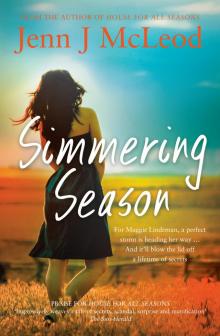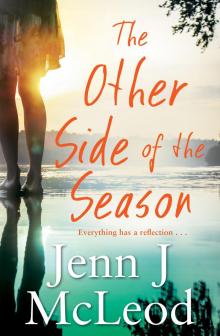- Home
- Jenn J. McLeod
Other Side of the Season Page 8
Other Side of the Season Read online
Page 8
• • •
After waving Pearl away, Sidney went on to sell two paintings to a newly married couple from Brisbane. A second vehicle arrived before lunch and the words painted on the side of the man’s truck made Sid laugh: Coastal Landscapes: when home is dirt by sea. He was a large man–certainly no Jamie Durie–but with the same impeccable taste in outdoor art. He’d lumbered around the garden, choosing several delicate pieces as well as the table Sid and Pearl had enjoyed tea on that morning.
The Brisbane people had stayed chatting to Sid for ages about all things art, disappointed to find the B & B no longer operating, but promising to check again in spring. For a moment Sidney contemplated referring them to Brushstrokes in the Bush before she remembered that it was closed too, the blinds drawn, the website taken offline. The fate of her mother’s dream business remained a big question, which was such a shame. Brushstrokes had made the perfect retreat for so many people. Hadn’t it been Sidney’s perfect hideaway after her split with Damien? Well, perhaps not perfect. Running back to her mother’s was the last thing Sid thought she’d be doing at her age, but Damien had left her with few choices.
Her partner had waited until the morning of an important meeting, while they prepared their own breakfasts in the compact kitchen–his, jam on toast and hers, homemade muesli. They’d worked around each other in the same way they had for years, following a well-choreographed routine, darting back and forth between the kettle, the toaster, the fridge, the sink, and taking it in turns to stop and check their respective phones for emails. But no longer did bumping into each other mid-routine lead to laughter, then morning sex and missed buses. Instead Sid grew used to a polite apology and a wide berth.
That dreadful morning a few months back, somewhere between mouthfuls of toast and muesli, Damien had dropped his bombshell. He’d said the words as though referring to the second slice of toast Sid had just handed him–buttered to the edges, the way he liked it.
‘I don’t want this,’ he’d told her.
‘The toast?’ Sid asked, confused.
‘Any of it. There’s not supposed to be a baby.’ Then, as if he’d merely bumped into her, he added, ‘Sorry.’
Strangely, Sid’s first instinct was to laugh. Damien was being Damien. She’d seen the same reaction a hundred times before. When forced into a corner he would pout like a toddler at the dinner table refusing to eats his peas. The only thing missing were the words, ‘You can’t make me.’
‘Honey, I understand you’re a little surprised by the news. Hey, I am too.’ She tried a smile. At least it felt something similar to a smile. Then she tried for a laugh from Damien. ‘When he broke the news, the doctor had to prop me up on the examination table so I didn’t fall off.’
Damien just stood there, his stare as cold as the untouched toast on the plate. ‘You always said you didn’t care about getting married–that a marriage certificate is simply a piece of paper.’
‘I didn’t care about getting married when it was just us. If this was about getting married, wouldn’t I have raised it before now? That piece of paper gets a whole lot more important when there’s a baby. It’s not just about us anymore, Damien. But there’s no rush. Although I’d hardly call getting married after seven years together a rush. When we’re ready is fine.’
When Damien didn’t react, she had to look away. ‘Geez, Damien, I don’t see the issue here. Your name still goes on the baby’s birth certificate–married or not.’
‘It does?’
‘You’re the father!’
‘Mmm, right.’ Damien swallowed hard, his Adam’s apple bobbing in his throat. ‘That’s just it.’
‘What is?’
‘Me . . . Not being ready to be a father.’
‘Well, hon, you have a few months to get ready. Sorry, but that’s the truth of it.’
‘Well, babe, while we’re being truthful, I’m not sure I’m ready for one person forever, let alone two.’
‘Oh, so, what? There’s someone else? Is this confession time?’ Exasperation edged her question with sarcasm. ‘You’re suddenly in love with someone else? Since when?’
‘That’s not what I meant. There is no one else. I wouldn’t cheat on you, Sid. You’re everything I need.’
Sid put her head to one side and flinched as she bit her bottom lip a little too hard. How could she have gone to bed in love and woken up to a crazy conversation like the one she was having right now? Damien tried to take her hand but she pulled away.
‘Don’t.’
‘Sid, you’re all I need. Together we have the perfect partnership. Me with my business acumen. You with the creative nous. The studio is on the cusp of being something really big. If only–’
‘You’re talking about the business?’ She was shouting now, no longer caring if the neighbours in the next apartment could hear.
‘I’m talking about the fact that I never knew you wanted a baby. I’m feeling a little trapped.’
‘That’s because we never talk about anything but the business.’
‘Because it’s our dream, Sid. What we’ve always wanted. Please, tell me we still share the same dream.’
Sid caught sight of the time on her wristwatch. ‘Damien, I’m not letting you do this to me this morning. You want to make this about the business? Then this conversation will have to wait until tonight. We have the Welshman presentation in an hour and I need to focus.’
‘See, babe, you love our business too.’
‘Of course I love it, Damien. I’ve put seven years of my bloody life into it.’
‘So what do we do?’
She studied Damien, shrugged and scooped the last mouthful of her muesli onto the spoon. ‘Well, I plan on making another doctor’s appointment. You can come with me, if you want. Or not. I’ll let you make a bloody decision on your own for once.’
‘So you’re going to get rid of it, then?’
For days afterwards, Sidney would pick dried specks of homemade muesli off the walls, the kitchen splashback and the glossy white kitchen cupboards and wonder . . .
How was it she could see those tiny specks so clearly and yet she’d failed to see what sort of man she’d been living with for years?
• • •
A chill rattled Sidney’s bones. The winter sun’s warmth had retreated early, the eerie late-afternoon silence on top of the mountain broken only by the melodic sound of wind chimes hanging in trees. She felt a little queasy, and the thought of hot tea beckoned–well earned tea after selling so many pieces in one day.
She also wanted to look around and find Jake, check on him. He’d whizzed by an hour ago, in his element on the quad bike, trailer hitched and loaded with fallen garden debris, the result of a wet and windy evening. She locked the cash register and popped the keys in the pocket of her jeans. Then, with the palm of one hand, she smoothed the loose-fitting top, rubbing her still small belly.
‘Would tea help fill you out a bit, Little Bump?’ she asked. ‘Let’s try.’
The residence was unlocked, just as Pearl had told her it would be. Still, she felt weird walking into a stranger’s house.
‘Helloooo?’ Sid sang out. When no one answered she stepped inside and immediately felt at home among so much art.
‘Can a house have too many paintings?’ she remembered asking her mother one day. She’d been small at the time and thought her mother’s paintings awfully big.
‘Never,’ Natalie had replied. ‘It’s all in the way they’re displayed. One should never overcrowd the walls, though.’
The never-overcrowd-the-walls rule had failed to reach the top of the mountain, with the walls in the front room of this rambling old house crowded with pictures of every shape and size. The frames, made of ornate metal, timber and polished resin, somehow all worked together. The furniture and scattered ornaments spoke of a feminine touch, and there were elaborate mirrors, too, artfully positioned. There was too much for Sid to take in all at once. She needed to get her tea, calm her be
lly, and get back to the gallery.
As she tiptoed through the house, looking for the kitchen, Sid passed several closed doors, each with a number–guestrooms, she supposed–and another dark hall branching off to the right. She paused before carrying on, but then a whimper sounded, and a curious Sid took two steps back. The noise came again, louder and more frantic this time, and she edged cautiously along the unlit passageway past three more numbered guestrooms, to pause at the fourth and furthest door. A sign, handwritten in black felt pen, read: No Entry.
She was about to turn away when the whimper changed–first to a guttural squeal, then loud snorts at her feet where a crack of sunlight illuminated the tips of her brown leather boots. As she inched the door open an unidentified ball of brown fur pushed frantically through the gap, scampering down the hallway.
‘What the–?’
Sid clutched at her chest, fright riveting her feet to the spot. Had it been a possum? A giant rat perhaps? Or worse, one of those big hairy spiders Pearl had said lurked in the banana trees? She stood deathly still, then, from nowhere, a giggle escaped, high and wild and nervous.
Once she’d caught her breath and her heartbeat returned to normal, Sid found herself staring inside a room not so dark that she couldn’t make out the contents.
She should have ignored the temptation to stay.
She should have closed the door.
She should have walked away.
She didn’t. She couldn’t. Not after spying the canvases and feeling an inexplicable pull.
The room was musty, all but one of its shutters pulled closed to block the sun. Sidney flicked the light switch, to no avail.
No bulb.
Adjusting the window louvres helped a little, the slanted beams of sunlight adding shadow and depth to the sketches around the room. Drawings covered every spare space, some pinned higgledy-piggledy to the old plasterboard walls. Other canvases and boards were stacked like cards on the floor, with the largest of them leaning against the walls–and all seemed to be of the same woman. Some were full length drawings, while others focused on aspects of her face and body: a mouth pursed and puckered; an eye closed, open, smiling; the graceful angle of her neck; the fall of her hair; the turn of her wrist. In a bizarre and obsessive way the artist had broken the woman’s body down into a series of sketches, pulling her apart piece by piece, every emotion captured on canvas: the sombre, the wistful, the vivacious.
One piece stood out. The detailed oil on canvas–a semi-nude–was of the woman kneeling. She was very young–not much more than a girl–and wore only a paint-splattered skivvy raised to expose breasts in a tangle with her bra. The almost life-size piece showed the model’s head thrown back in rapturous laughter. Or had the artist captured her at the height of sexual pleasure? Elation licked the skin on the back of Sidney’s neck when she realised she wanted to laugh with the woman, share in the thrill and her uninhibited joy. Was the model real, Sid wondered, or perhaps the artist’s carefully crafted composite? The woman of his dreams perhaps? The nudes were confronting and Sidney tried to imagine what it would be like to bare everything–to have her body and emotions dissected, to expose herself so completely. While there was something beautiful about a woman’s form portrayed on canvas, Sidney knew she could never be that reckless, nor that brave. Damien had knocked any sense of self-worth out of her with his parting words: ‘You’re making the wrong choice, Sid. You’re not the type to go it alone. Do you know what a baby will do to your body? A baby changes everything. Ask my brother what happened to their sex life.’
Sid squinted at the louvred sunlight now painting its own picture over the walls and floor, highlighting a table festooned with old palettes, dried tubes of paint, and paintbrushes stiff with neglect. A tower of art books listed precariously in one corner and as her finger traced the spines–Pro Hart, Nolan, Lindsay, Namatjira–she caught sight of a slender notebook tucked between several ring binders and a collection of red foolscap-sized journals–the hardcover kind used to keep handwritten accounts. If not for the bunched pages Sidney might not have noticed the fancy notepad. Once seen, however, she felt a strange compulsion to investigate and she was soon prising the pad out into the light. Tinted the palest of pinks, and with a rose watermark, it seemed unlikely to belong to a man.
With the urge to flick open the cover stronger than the fear of discovery, Sid listened for movement, for sounds down the hallway, or the buzz of the gallery alert system. Hearing nothing, she smoothed out the crumpled pages caused by the cramped confines and noticed a message scratched into the inside cover. The scrawly handwriting was at such a slant Sidney instinctively tipped her head to the side to decipher the inscription:
For my Rose among roses,
So you can write to me every day–always and forever.
Sid felt guilty. She’d expected a sketchpad. Instead, as she thumbed the first few pages, she saw small, neat handwriting. Not the unruly and unreadable scribbling of an artist, but a flowery longhand. A letter writer with a distinctly feminine style. Biting down on her bottom lip, and with a final furtive look at the door with its No Entry sign, Sid sank down in the old leather office chair and started to read.
My darling husband,
The property is so quiet. I miss you and that big, booming voice. I remember when the children were young, how you would sing your favourite Slim Dusty songs in the shed where you thought no one could hear.
I sit here now in your favourite chair, writing to you, hiding from a world turned angry. I close my eyes to imagine the chair’s arms as your arms, coming to life and wrapping around me, holding me, supporting me, comforting me.
We are lost without you, but we manage. I think you heard about young Tony Sheaves leaving just as the tourist season was upon us. Thank goodness we can rely on the ignorance of newcomers to town to ensure we have the help we need. That is until they, too, hear the gossip. It is as you predicted. So many of the people we once called our friends are deserting us, blind to anything other than their own pain. Do they not think we also feel pain? Do they not see our tears or remorse and remember the pain we also endured? The house has never seemed so isolating, and I pray I am reunited with you soon.
David is here to keep me company, of course, and does his best to fill the property with colour and beauty. The gallery is getting more and more interest, and Ernie Watts has recommended council secure a grant for a sculpture down by the foreshore. We can be very proud of David. He could have let what happened destroy him, but he has your strength for pulling through the tough times. Be assured of our undying belief and faith that one day the plantation will again be filled with love.
I do so look forward to every letter from you. Hearing your voice, too, is wonderful, but it is our letters that bring back such fond memories of our courtship. These young things with their computers and silly smiley faces will never know the joy of words, or of simple paper hugs and kisses.
Oh, I almost forgot. Your last letter mentioned Albie Marhkt tried to make contact with you. I dare not ask, and yet I am curious about his purpose. Not to mention the hide of the man. Perhaps in your next letter you might tell me more.
One other thing I must–
There was a sound somewhere in the house and Sid stiffened in the chair. Footsteps. Someone was coming. She slid the notepad back between the art books and jumped up, keen to slip out of the room undetected.
Too late.
A man stood in the doorway, glaring at her. Sid adopted her it-wasn’t-me-mum stance: hands behind her back, shoulders pulled taut, innocent eyes wide and blinking.
‘What are you doing?’
‘Pearl said I could make tea,’ Sid said weakly, a shiver of guilt snaking its way along her spine. ‘She told me to let myself into the house.’
‘Tea?’ His gaze did another sweep of the room.
‘I didn’t mean to be rude.’ Rude sounded better than snoopy. ‘I’m Sidney. My mother named me after Sidney Nolan.’ As if that useless bit of trivia wa
s going to make a difference. She coughed, hoping to dislodge the croak in her throat. ‘There was a noise. A possum, I think. Either that or the rats up here are the biggest I’ve ever seen.’ Sid’s attempted humour failed, silence making the moment more awkward. ‘Look, I’m really sorry for snooping. I saw the works in here and couldn’t help myself.’
His stare darted from her to the paintings and back to Sidney again. ‘You’re the new girl in the gallery.’
‘That’s right.’ Even though it had been a while since anyone had referred to Sid as a girl. ‘Nice to meet you.’
The man said nothing, not even acknowledging her apology, and Sidney was suddenly just plain cranky.
She lifted a defiant chin. ‘If you’ll excuse me.’
When the man didn’t move quickly enough, she ducked under the arm bracing the doorway and strode down the long hall, her need for that tea even stronger.
12
Watercolour Cove, 2015
Everything Sid needed to make tea was already on the kitchen bench, pushed back and lined up along the tiled splashback, but within reach–no hunting through cupboards required–which was just as well as she felt guilty enough about prying.
‘Great first impression, Sid,’ she muttered as she chose a cup and inspected the handwritten labels on wooden canisters.
‘I thought so,’ came a deep voice from behind. ‘And I’m not the only one.’
Startled, Sid spun around too quickly, almost knocking a cup to the floor.
And now you’re breaking the precious china!
In the doorway was the same man–her boss–but for the first time she noticed the two forearm-style crutches.
‘Here, this is for you.’ Without extending his arm, his hand wiggled the envelope about. ‘Take it, please.’

 A Place to Remember
A Place to Remember Simmering Season
Simmering Season Season of Shadow and Light
Season of Shadow and Light House for All Seasons
House for All Seasons Other Side of the Season
Other Side of the Season